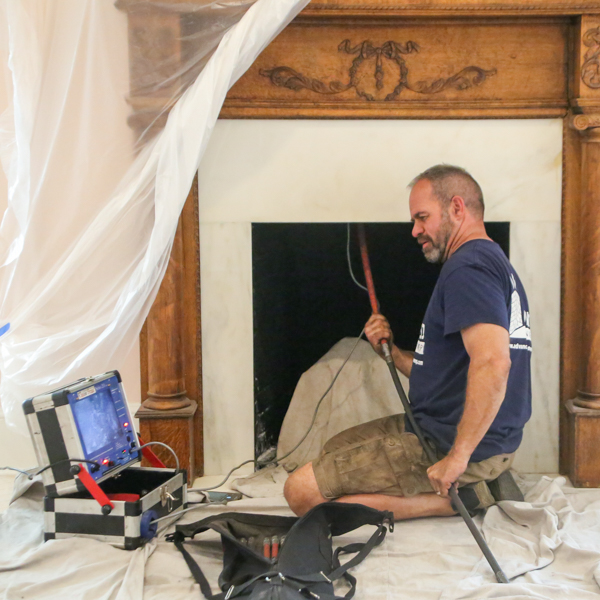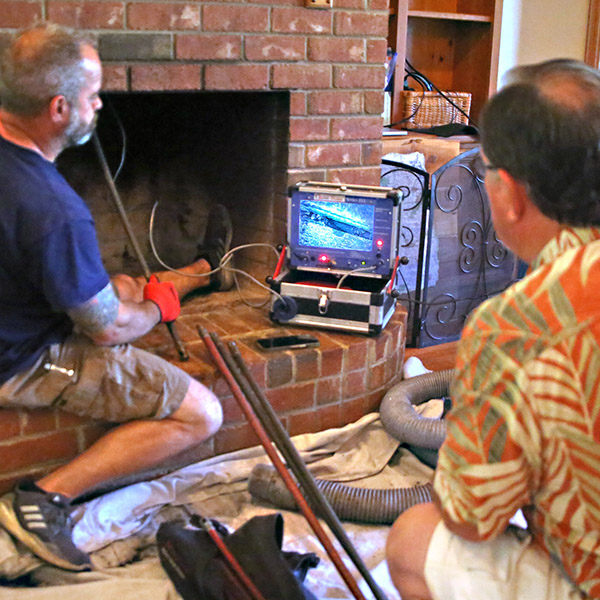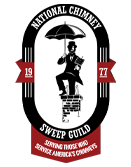When to Schedule a Chimney Inspection
Annual chimney inspections are essential for keeping your fireplace and chimney in proper working order and protecting your family from the risk of a chimney fire. But, many people don’t know when is the right time to schedule a chimney inspection and how frequently it should be done. We’ll answer these questions in this post.
 Why You Need a Chimney Inspection
Why You Need a Chimney Inspection
Most homeowners that use a fireplace regularly to keep warm during winter realize the importance of regular chimney cleaning and inspection, but some either don’t think about it or mean to do it but keep putting it off.
First, let’s talk about what a chimney inspection is.
A chimney inspection is when a Chimney Safety Institute of America (CSIA) certified chimney professional evaluates the overall health and safety of your chimney and fireplace to ensure it’s fit for use. There are three levels of chimney inspections as outlined by the National Fire Protection Association, which we’ll get into shortly.
Routine chimney inspections are important because they significantly reduce the risk of problems that can lead to carbon monoxide and other toxic gases from coming back into your house and the chance of a chimney fire. The reason you need a pro for this job is that they have the training and experience to spot issues an amateur might miss — issues that can lead to devastating consequences, like creosote buildup, chimney damage, and flue blockage.
Chimney Dangers
So, what issues do a professional chimney service look for when they conduct a chimney inspection?
Flue Damage
The flue is the conduit that carries smoke and fumes from the fireplace out of the house. Most modern chimneys have a flue liner, which is subjected to extreme temperatures every time you use your fireplace. Repeated exposure to these temperatures can cause the liner to crack, exposing your home’s combustible materials to extreme heat that can lead to a fire.
Creosote
Creosote is a combustion byproduct of burning wood in the fireplace. Creosote starts as a flaky substance, but builds into a sticky coating over time that’s difficult to remove. The problem with creosote buildup is that it’s highly flammable and is one of the primary causes of chimney fires.
Flue Blockage
Lastly, it’s common for critters like birds, squirrels, and rodents to make their nests in your flue, causing a blockage that prevents proper venting and can cause smoke and carbon monoxide to flow back down into your home.
Chimney Inspection Levels
Every chimney is different, and no two chimneys require the same inspection level or types of care. Professionals certified by the Chimney Safety Institute of America are trained to provide three levels of inspection per the NFPA 211 standard to ensure your chimney is safe to use.
Here’s a brief overview of each inspection level.
Level 1
A level 1 inspection is required is the minimum requirement for most homeowners who use their chimney and fireplace in the same manner every year. So, if you intend to burn the same fuel, under the same conditions, a level 1 inspection will suffice.
 Level 2
Level 2
A level 2 inspection is required if you make any changes to your fireplace and chimney system. For example, if you switch from burning wood to gas, or you installed a new flue, you’ll opt for level 2. Furthermore, if you’re selling or transferring your property, you must perform a level 2 inspection.
Level 3
Lastly, it’s required that you perform a level 3 inspection to address possible structural damage to the chimney caused by a fire, extreme weather, or seismic event.
When Should You Schedule a Chimney Inspection
According to the Chimney Safety Institute of America, “Chimneys, fireplaces and vents shall be inspected at least once a year for soundness, freedom from deposits, and correct clearances.” You can schedule a chimney inspection any time, but most people do it in the fall. However, we recommend scheduling it earlier because that’s when most chimney service companies are busy, and it may take longer than expected to get service.





